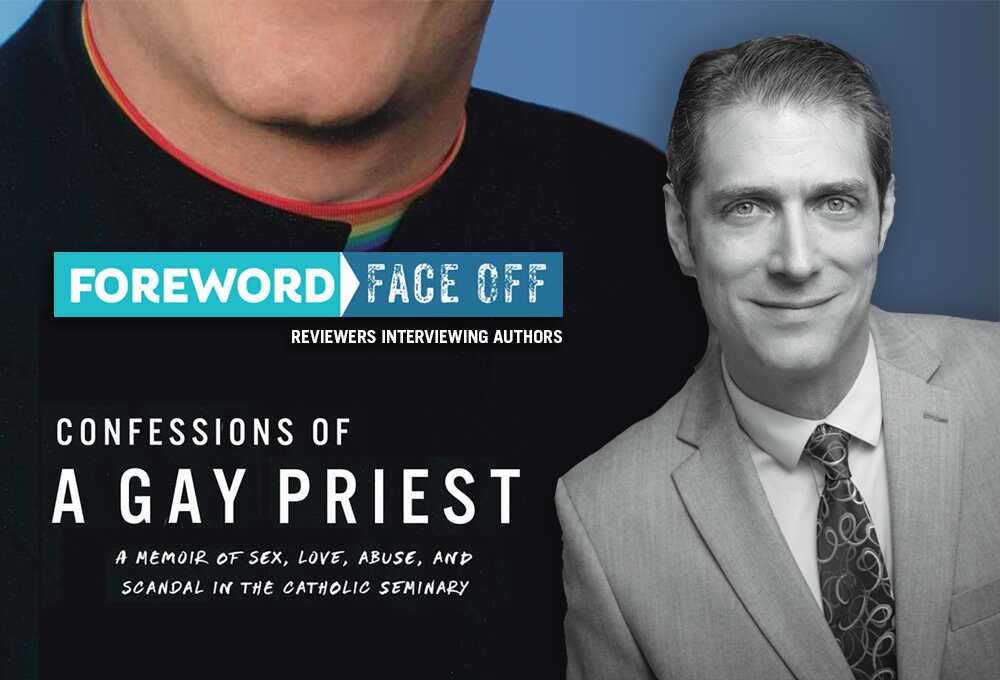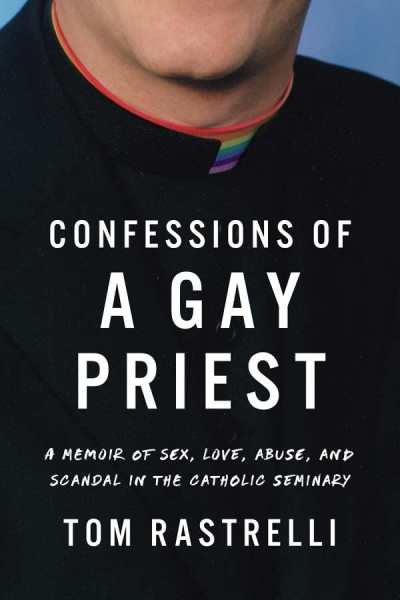Reviewer Meredith Grahl Counts Interviews Tom Rastrelli, Author of Confessions of a Gay Priest: A Memoir of Sex, Love, Abuse, and Scandal in the Catholic Seminary

In our mind, nothing is more heartbreaking and infuriating than the Catholic Church’s sexual abuse scandal. Between the coordinated, predatory behavior of the priests, to the lies and coverups, to the shuffling of guilty priests into unsuspecting parishes, the whole sordid affair all but destroyed our faith in things sacred and noble.
Which is why this week’s interview is important—it offers a ray of hope.
Meet Tom Rastrelli.

In his courageous Confessions of a Gay Priest, Tom recounts his sexual abuse at the hands of a childhood doctor, abuse by Catholic clergy when he was a college student, and coming to terms with his own sexuality while beginning to study for the priesthood. Yet, despite the crushing effects of these experiences, in Confessions, Tom maintains a sense of resilience and hope, of breaking free and healing. His example offers a powerful lesson for others facing similar circumstances, in addition to further documenting sins of the Church.
COVID-19 has challenged many authors who can’t tour and promote their new books. When asked about debuting a book at this particular moment in history, Tom is characteristically undismayed. He says, “If anything, having a pandemic as the final obstacle to getting my story out there seems darkly apropos. My journey out of the clerical closet was filled with obstacles, why wouldn’t the publication land in the middle of another?”
Meredith Grahl Counts reviewed Confessions in the May/June issue of Foreword Reviews and jumped at the chance to interview Tom when we pitched the idea. We’d also like to give a special shoutout to the University of Iowa Press for publishing this important work.
Meredith, take it from here.
I wonder what the process was like to write this memoir. It must have meant reliving moments of growth and joy of a greater calling, alongside harrowing experiences of the abuse you survived. Did you think about any particular audience while you were writing the book?
After I left the priesthood and recovered from my depression, I decided to become a writer. I believed that to tell others’ stories well, I needed to figure out how to craft my story first. From September 2005 to May 2006, I wrote the first version of what eventually became Confessions of a Gay Priest. At that point, the writing was cathartic. I wrote out everything I could remember, as quickly as I could get it on paper. I wrote this draft for myself, so that I could come back to it and use pieces of it to build future characters or scenes in my writing.
That version eventually became a fictionalized screenplay, Fire in the Priory, that I tried to sell when I moved to Los Angeles in 2006. Agents said Priory read like a novel, so I rewrote the fictionalized version as a novel and tried to sell it. After advent of the writers’ strike and the Great Recession, I returned to graduate school for writing at University of Southern California in 2009. I planned to focus on fiction and screenwriting, but hearing my personal essays and story, my professors and classmates encouraged me to write memoir and creative nonfiction.
In 2010, I began writing the first draft of the current version of Confessions. This time, I returned to my primary sources: my journals, old letters and cards, official documents, class notes, and scrapbooks. I mapped out the beats that I needed to tell the ten year arc of my journey into and out of the priesthood. I began writing. Recreating these events, even my experiences of being abused, was empowering. The more I honed my writing skills and saw my classmates and professors experience the truth of what I experienced, the more I worked to improve my skills. In workshops, I listened to the responses of people across gender, race, culture, religion, and orientation. Most everyone was fascinated with the clerical subculture and wanted more.
I quickly realized that my experience of being abused was nearly universal. Everyone in my classes had experienced sexual abuse or knew someone who had been. My story was universal but told through the lens of my experiences and circumstances. While my primary audience was other victims of sexual abuse, LGBTQ Catholics, ex-Catholics, and progressive Catholics, I wanted to write so any reader could experience what it was like for me to be groomed and recruited into the cycle of sexual abuse that continues to exist in the Catholic Church today. The book is definitely very Catholic in it’s vocabulary and setting, but the experience of being recruited by charismatic personalities into a subculture with a cult-like control over the thoughts and actions of its members is not all that different from what we’re seeing at a national level in today’s politics.
Since finishing the first rewrite in 2012, I went through two agents, a few close sales, edits, rewrites, and many rejections. I quit trying to sell the manuscript and stepped away twice, only to be drawn back to it by the next wave of news articles exposing more abuse in the Catholic Church. In early 2019, after Cardinal McCarrick of Washington, DC, was exposed for abusing seminarians and newspapers began printing articles about stories like mine, I tried again, and secured a sale with University of Iowa Press.
Confessions of a Gay Priest is your own story, but in sharing it you’re also giving us a look at the inner workings of the Church. What was that like as a writer?
It’s been freeing and empowering to share what happened in the clerical closet. Having lived through these events and worked through them in therapy, I’d normalized them. Seeing others read and respond to them has reminded me of how messed up things were and how hard I had to fight to escape. I’ve been reminded of how important it is for my story, and others like mine, to be told. The more we expose abusive individuals, the systems they control, and how they groom and manipulate individuals and communities to maintain their power, the more we will be able to break the cycle of abuse in our families and communities. This sounds cliche, but it’s true. If just one person reads my memoir and finds the strength to break the cycle of abuse in their life or helps someone to do the same in theirs, then it was worth getting my story out there.
You discuss the high dropout rate for seminary students and new priests, the culture of religious studies, and then church work and placement. It is sort of a secret world. I hadn’t really known anything about the world of the contemporary seminary and the priesthood—albeit, a little through Patricia’s Lockwood’s 2017 memoir, Priestdaddy, about her father who’s a rare, married Catholic priest. It made me wonder how people respond when you tell them you were once a priest, or whether it even comes up. Are people curious? It must have been a hard role to shake when you left?
Yes, people are almost always curious. They also feel free to ask very personal questions about it, which I find fascinating. When you find out someone is divorced, you don’t ask them, “Why did you leave?” But that’s a common question people ask when they find out you were a priest.
At first, this assumed intimacy bothered me. I didn’t want to talk about it. Then, as I regained my mental health and owned my narrative, I decided I’d just tell people the truth when they asked. Some got more of an earful than they expected. But they asked, right? Over the past six years, as I failed to find a publisher, I moved on to the point that I didn’t even think about my priestly past on most days. Now that the memoir is out, I’ve corresponded with some readers who view me back in that priestly role. It feels as foreign and familiar to me as the closet. It’s a part of my past, and affects who I am today, but I choose not to live there. I choose freedom.
Here’s a lighter, fun question: Music and singing is a theme throughout the book. When you were a young college student, you were a musical theater student. Later you recall singing in church, and relieving stress in seminary with song. So what songs have you been singing lately?
Lately, I’ve been singing a lot of Queen, Elton John, and George Michael. I’ve continued to reclaim the gay singers of my youth that I wasn’t able to embrace while in the closet. The songs speaking most to me right now are songs of empowerment and positive energy. It’s so difficult to stay positive with the pandemic and constant news of death. I’m trying to keep my singing time energetic and fun.
Is there some healing power in music and in writing?
Absolutely. In sharing our songs and our stories, we are understood and thus united.
Meredith Grahl Counts
